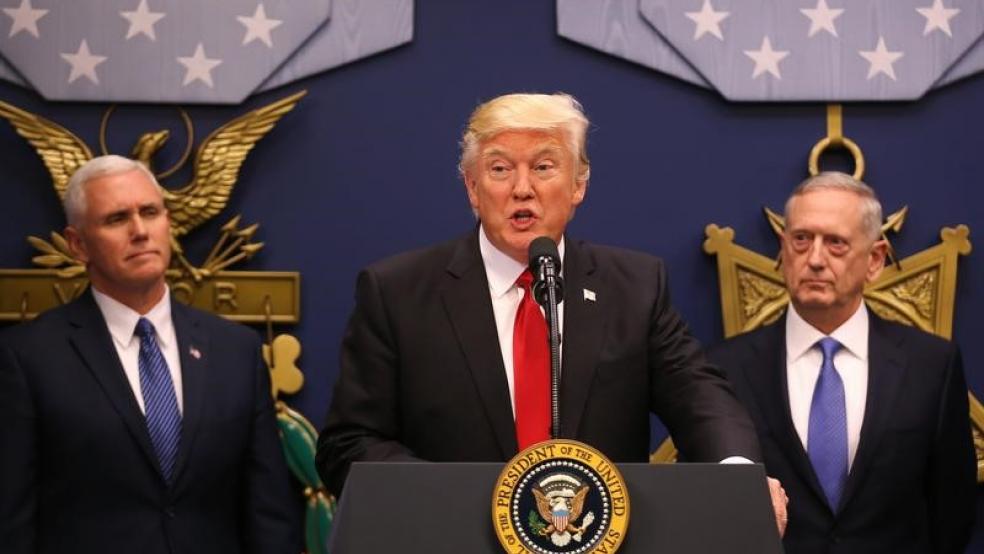Donald Trump on Wednesday continued what increasingly looks like a campaign of intimidation against federal judges, as the legality of his executive order barring refugees and citizens of seven majority-Muslim countries from entering the United States is debated in the courts.
The attacks began last week, when a federal judge in Seattle issued a temporary restraining order that blocked the administration from enforcing the travel ban until the courts could reach a decision on whether it complies with the law. The basic conflict appears to be between federal law that prohibits using a person’s national origin as a criteria for blocking entry into the country and a separate statute that gives the president the authority to “suspend the entry of all aliens or any class of aliens as immigrants or nonimmigrants, or impose on the entry of aliens any restrictions he may deem to be appropriate.”
Related: Defying the Best Legacy of the Free World, Trump Instills Fear Itself
Trump attacked Seattle Judge James Robart last week, predicting “death and destruction” if his order is not obeyed. He urged people to hold the court system in general and Robart in particular responsible for putting the country at risk of a terrorist attack.
“Just cannot believe a judge would put our country in such peril,” Trump tweeted. “If something happens blame him and court system. People pouring in. Bad!”
Trump’s attack on the judiciary raised alarm among legal experts. On Monday, American Bar Association President Linda A. Klein said, “It is vital that our judiciary remains independent and free from political pressure—independent from party politics, independent from Congress and independent from the president of the United States himself.”
But Trump has shown little concern about the appearance that he is pushing against the boundaries of the separation of powers between the executive and judicial branches of the government.
Related: Trump May Be the First Test Case for His Own Supreme Court Nominee
On Wednesday, even as a three-judge appeals court panel of the Ninth Circuit Court of Appeals was in the process of deciding whether or not to leave Robart’s ruling in place, Trump appeared at a gathering of law enforcement officials in Washington to attack the process. He called the arguments against his executive order “disgraceful” and continued to suggest that if the courts do not rule in his favor, they should be seen as placing the country in danger.
Trump showed up at the event with about 15 minutes’ worth of prepared remarks, but spoke for more than 25 minutes because the first part of his appearance was dedicated to a free-associative riff on the case.
Trump brought a copy of the section of the U.S. Code that, he believes, gives him the authority claimed in the executive order, and he read part of it out loud. He then began to address the oral arguments in the case, which were carried live on some news programs Tuesday evening.
“If these judges wanted to, in my opinion, help the court in terms of respect for the court they’d do what they should be doing,” he said. “It’s so sad when you read something so simple ... so perfectly written and so clear to anybody and then you have lawyers and I watched last night in amazement and I heard things that I couldn’t believe. Things that really had nothing to do with what I just read.”
Related: Why British Parliament Is Threatening to Slam the Door on Trump
He continued, “I don’t ever want to call a court biased, and I won’t call it biased and we haven’t had a decision yet but courts seem to be so political and it would be so great for our justice system if they would be able to read a statement and do what’s right and that had to do with the security of our country which is so important. Right now we are at risk because of what happened.”
Trump defended his own reading of the law, adding, “I was a good student. I understand things. I comprehend very well, okay? Better than I think almost anybody. And I want to tell you I listened to a bunch of stuff last night on television that was disgraceful.”
He added, “I think it’s sad. It’s a sad day. Our security is at risk today and it will be at risk until such time as we are entitled and get what we are entitled to as citizens of this country as chiefs as sheriffs of this country. We want security. One of the reasons I was elected was because of law and order and security.”
In an op-ed published Wednesday, before Trump’s most recent discussion of the case, Connecticut Senator Richard Blumenthal said the president’s “intimidating and threatening missives attacking the judiciary, and his personal invective and insults raise core constitutional dangers.”
Related: Here’s Why Trump May Be Sending More Jobs to Mexico than He Saves
But the president’s assaults on the independence of the judiciary are, so far at least, not raising much alarm among the Republicans running both houses of Congress. Asked about Trump’s behavior on Tuesday, House Speaker Paul Ryan said “Look, I know he’s an unconventional president ... He gets frustrated with judges, we get frustrated with judges. But he’s respecting the process, and that’s what counts at the end of the day.”
Trump, he added, “is honoring the ruling.”
If it seems strange that the speaker of the house is praising the president of the United States for not openly defying the ruling of a federal judge, well, that’s where we are today.





